Instead of digging through filing cabinets or scrolling endless email chains to find a contract you signed months ago, picture everything stored in one searchable hub. Contract lifecycle management software acts like a digital assistant, helping businesses manage contracts from start to finish.
CLM software speeds up contract processes with automation and standardization. Pre-approved templates save time by removing the need to start from scratch. Automated workflows send contracts directly to the right stakeholders, eliminating manual steps. Tasks that once dragged on for weeks now finish in days or even hours.
Here are the leading Contract lifecycle management software shaping how businesses manage contracts in 2025.
Top 10 Best Contract Lifecycle Management Software
1. Docusign
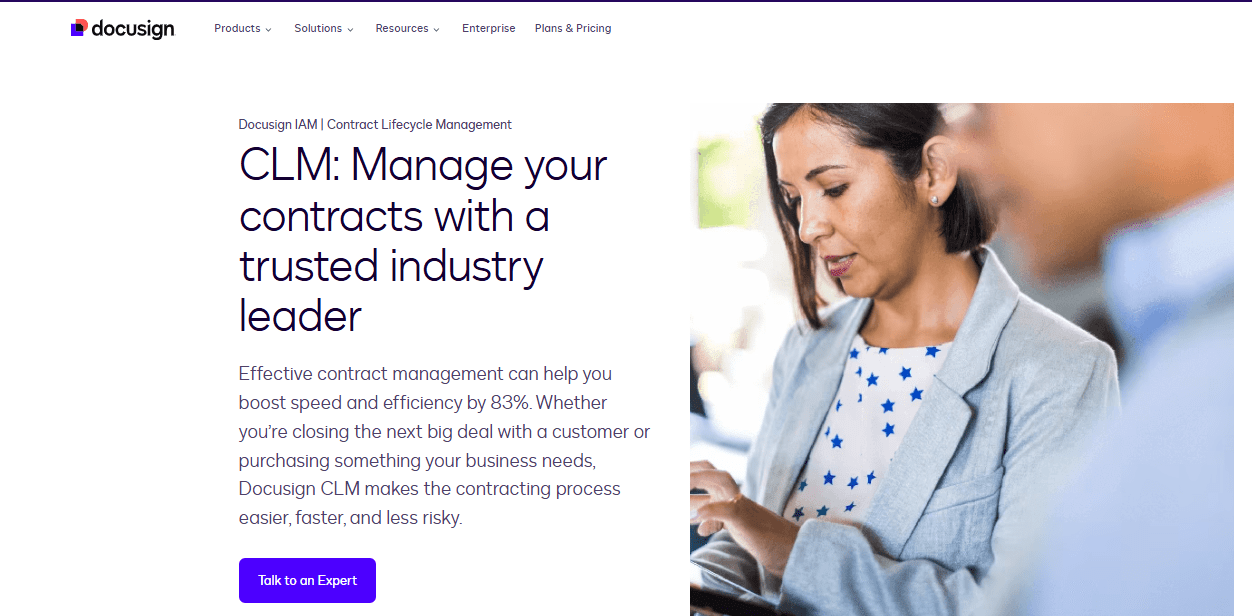
Docusign CLM is a contract lifecycle management software that helps businesses streamline and automate contract processes. Organizations across industries use it to manage complex workflows efficiently.
The platform centralizes contracts in one repository, provides permissions, and offers advanced search, reporting, and analytics. Users can build automated workflows through a drag-and-drop editor with pre-configured steps. Docusign CLM also usesAI to summarize contract terms and deliver actionable analysis.
Features
- Workflow Automation: Automate tasks such as contract creation, routing, and sending for review. Configure routing paths for different scenarios.
- Contract Repository and Permissions: Store all contracts in a centralized system with access controls for different roles.
- Search and Reporting: Locate contracts quickly and generate reports to track key metrics.
- AI-Powered Analysis: Use artificial intelligence to summarize terms and analyze risks.
- eSignature: Sign documents with legally binding digital signatures. Customize branding and verify identity through bank-based IDs, personal questions, liveness detection, biometric checks, or photo ID.
- Audit Trails: Track every action in the contract lifecycle. See who viewed, edited, signed, or approved documents.
Pros
- Provides excellent document storage and distribution capabilities.
- Supports flexible workflows that handle complex validation scenarios.
- Offers strong Salesforce integration for CRM-driven contract management.
Cons
- Implementation requires significant time and resources.
- User interface feels unintuitive and can be difficult to navigate.
- Auto-sync and collaboration features are limited.
Pricing
Personal – For individuals and sole proprietors with basic e-signature needs
Price: $10/month ($120 billed annually)
Standard (Most Popular) – For small to medium teams that need to send, sign, and collaborate
Price: $25/month per user ($300 billed annually)
Business Pro – For automating and optimizing agreements with advanced features
Price: $40/month per user ($480 billed annually)
2. Ironclad
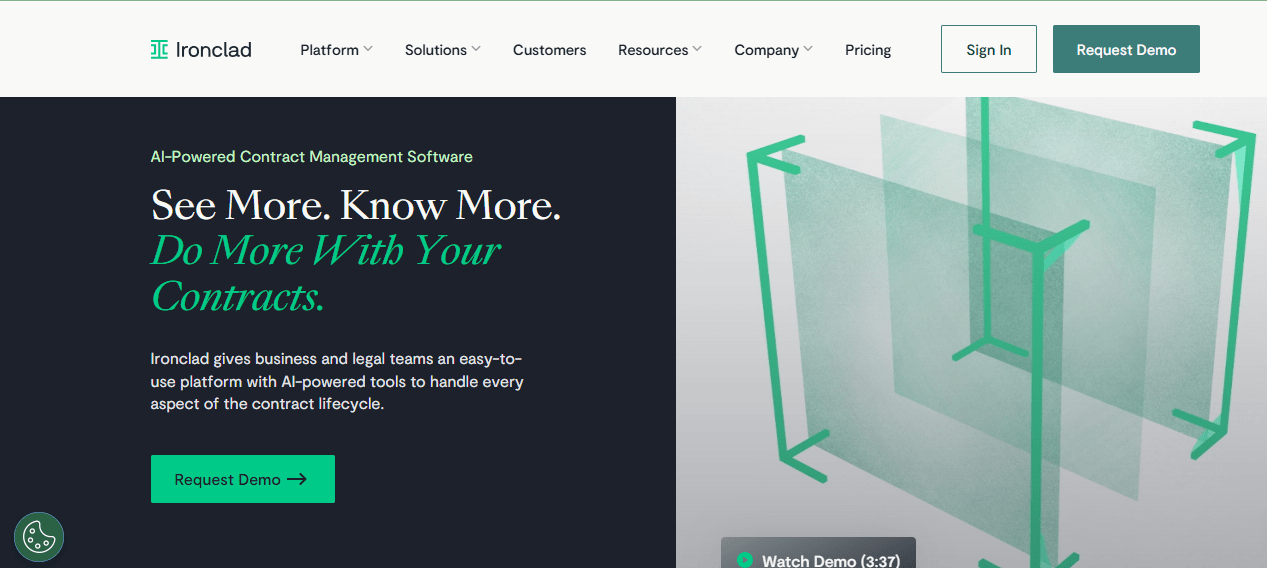
Ironclad CLM is a cloud-based platform that automates end-to-end contract management with a strong focus on legal workflows. It helps businesses create, negotiate, execute, and manage contracts across all teams and contract types.
The platform combines ease of use, Salesforce integration, native e-signature, and AI-driven features to simplify the entire contracting process. With a self-service portal, users can design and customize templates to quickly build any type of contract.
Features
- E-Signature: Sign contracts with Click-to-Accept, Ironclad Signature, or third-party tools.
- Workflow Designer: Build contract processes using customizable, code-free templates.
- Edit contracts with comments, mentions, and change tracking.
- Repository :Store all contracts in an AI-powered repository with tags and indexing for easy search.
- Reporting: Evaluate risks, opportunities, and performance with real-time data. Export reports as PDFs or CSVs.
Pros
- Automates contract workflows, reducing manual work significantly.
- Integrates easily with Slack for updates and notifications.
Cons
- Lacks workflow turn tracking to identify current handlers.
- Document editing requires HTML knowledge.
Pricing
- Available through custom quote.
3. HyperStart
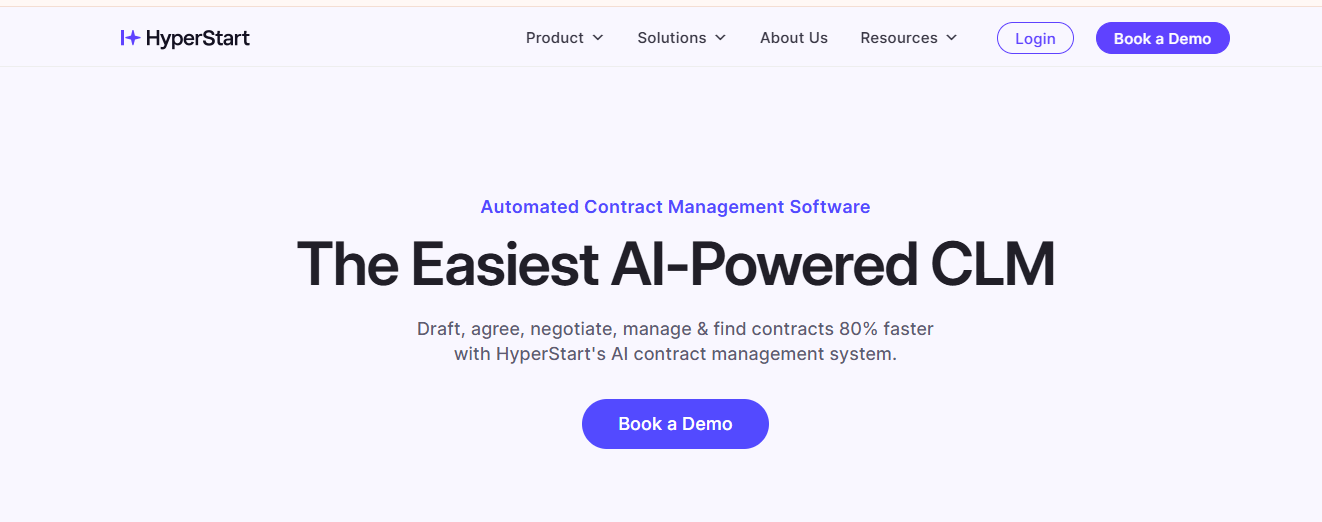
HyperStart is a contract management platform built to simplify how businesses create, review, and track agreements. The platform also supports electronic signatures, helping businesses finalize deals faster without relying on traditional paperwork. With all contracts stored in a centralized dashboard, users gain full visibility into ongoing agreements, upcoming renewals, and critical deadlines. HyperStart integrates with existing business tools such as CRMs and ERPs, making it easier for companies to manage contracts within their current workflows.
Features
- Quick contract creation: Draft contracts in minutes using templates and an easy-to-use interface.
- Automated generation: Pull in required clauses and legal terms automatically from pre-defined templates.
- Digital signatures: Get contracts signed electronically, cutting delays from physical paperwork.
- Centralized dashboard: Monitor active contracts, renewals, and deadlines in one place.
- System integration: Connect with CRM, ERP, and document systems for a unified process.
Pros
- AI repository extracts standard clauses and metadata.
- Automatic contract renewals reduce missed deadlines.
- AI-assisted review and redlining improve accuracy.
Cons
- Mobile version lacks full functionality compared to desktop.
- Custom configuration can be complex.
Pricing
Book a demo to learn more about HyperStart’s pricing and features.
4. Agiloft

Agiloft manages contracts by storing, analyzing, and reviewing documents while handling their entire lifecycle, from creation and negotiation to execution, renewal, and compliance. The platform scales easily, adapts to business requirements, and integrates with multiple systems. Agiloft stands out because its no-code customization capabilities allow businesses to tailor workflows without technical expertise. Unlike other tools that require coding for deep customization, Agiloft gives businesses a clear advantage in flexibility.
Features
- Contract authoring and templates: Create standardized documents using templates to reduce errors and compliance issues.
- Alerts and reminders: Receive notifications for important milestones such as renewals, reviews, and expirations.
- No-code workflow builder: Build and modify contract workflows using a no-code interface.
- Quick search with Convo AI: Use natural language search to locate clauses, key data, compliance metrics, and contract details.
- AI-powered platform: Import legacy contracts, review agreements, and optimize workflows with AI algorithms.
Pros
- Automates approval processes for faster contract management
- Integrates with Salesforce, Jira, and Microsoft Office
- Provides extensive customization without coding
Cons
- Higher starting cost compared to competitors
- Steeper learning curve due to extensive customization features
Pricing
Contact vendor for pricing details.
5. ContractSafe
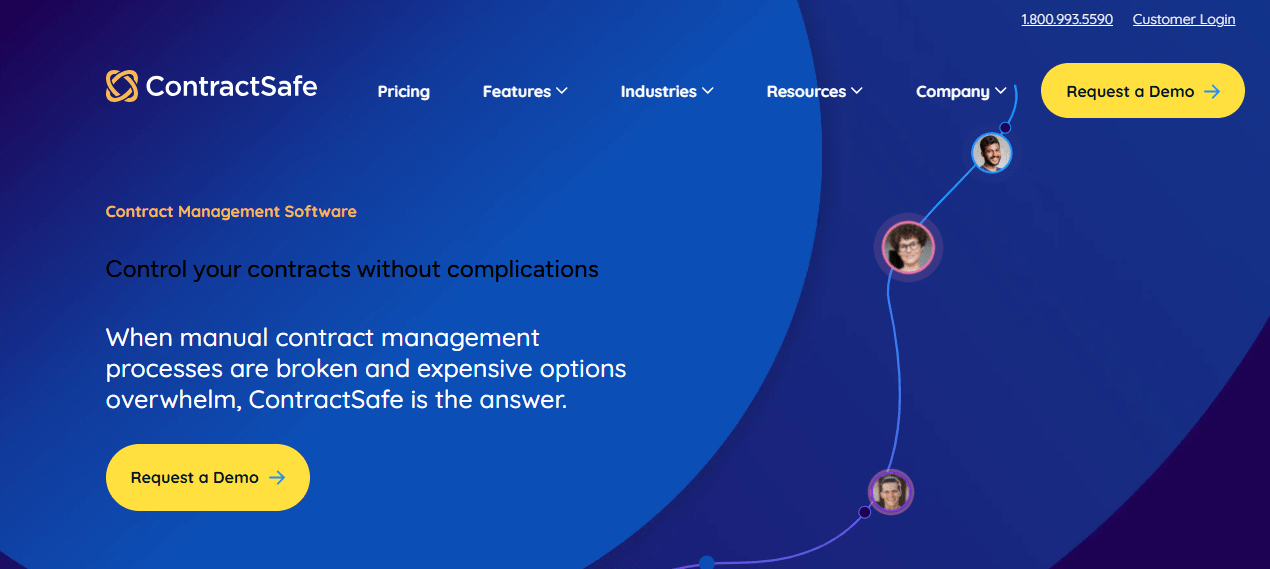
ContractSafe gives you a centralized hub for all your contracts, so you can quickly access crucial documents, maintain control, and reduce the risk of missed details. Its advanced search and filtering options let you quickly retrieve information such as contract terms and renewal dates. The automated renewal reminders help you stay on top of deadlines, ensuring you never miss renewals or compliance requirements.
Features
Smart search with AI tools, keyword options, and OCR technology.
Contract monitoring with alerts, reminders, and a shared calendar.
User roles and permissions to manage access and ensure security.
Pros
- Organized and secure contract storage
- Automated email notifications.
- Excellent customer support.
- User-friendly interface.
Cons
- Limited charts and table tools.
- Customization options are somewhat restricted.
- No drag-and-drop functionality.
Pricing
- Organize Plan – $375/month
- Finalize Plan – $579/month
- Maximize Plan – $746/month
6. Conga
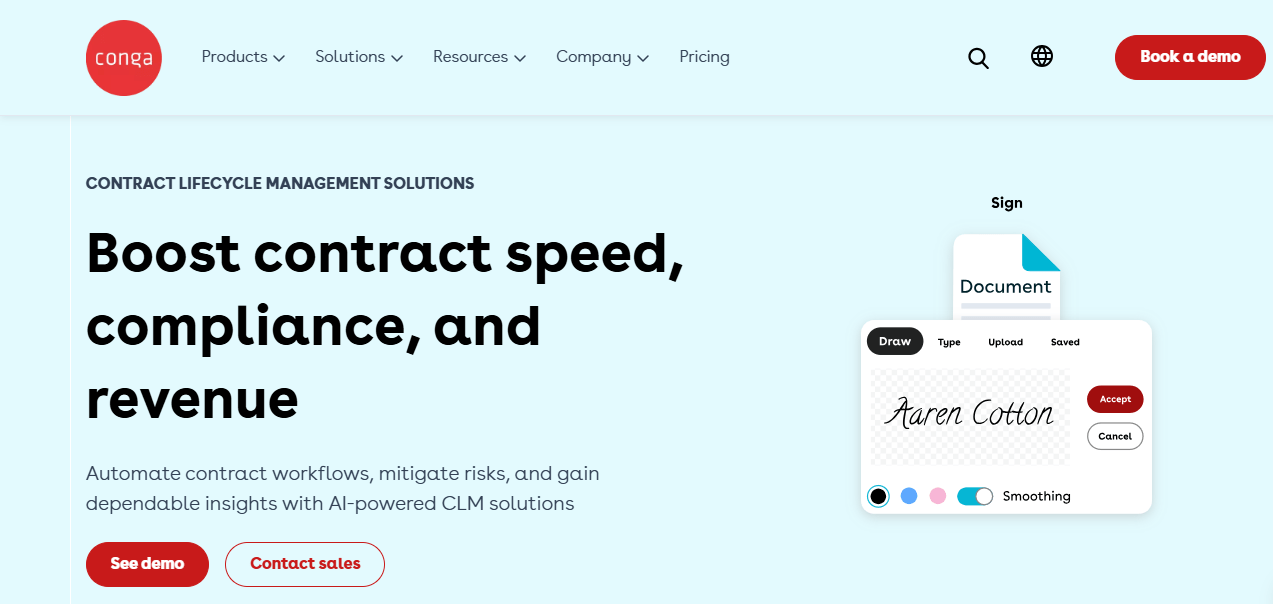
Conga Contract Lifecycle Management software automates and accelerates contract processes to improve visibility, reduce risk, and drive faster revenue cycles. It centralizes contracts in a secure repository, uses AI-driven tools to power workflows, and integrates seamlessly with CRMs and ERPs. Designed for enterprise-scale needs, it delivers standardized workflows, advanced AI capabilities, and performance analytics to support legal, procurement, and sales teams.
Features
- Centralized, secure repository for all contracts with role-based access controls.
- Automated workflows for contract generation, approvals, redlining, and clause management.
- AI-powered tools for risk detection, metadata extraction, compliance scoring, and multi-language support.
- Customizable reporting and analytics to track contract performance and bottlenecks.
- Integrations with CRM and ERP systems for unified contract data management.
Pros
- Deep integrations, especially with Salesforce, that make contract handling faster.
- Rich automation and AI tools that reduce manual effort and flag risks early.
- Highly scalable and configurable to meet enterprise contract volumes and complexity.
- Strong visibility and tracking through real-time reporting, dashboards, and audit trails.
Cons
- Complex implementation that often requires expert support and training.
- Steep learning curve with an interface some users find less intuitive.
- Customization can be time-consuming and resource-heavy.
Pricing
- Conga offers custom pricing plans based on organization size, features, and contract volume.
7. PandaDoc
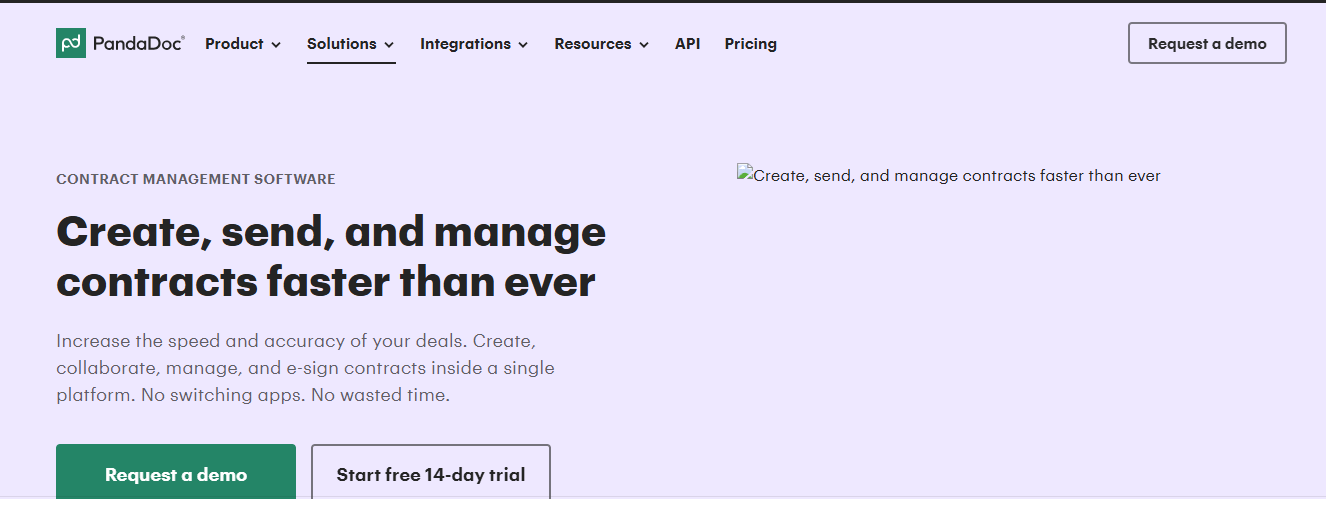
PandaDoc manages the entire contract lifecycle drafting, negotiating, signing, tracking, and renewing within one platform. Businesses use its drag-and-drop editor, CRM integrations, real-time collaboration, and built-in e-signatures to speed up contract execution, reduce errors, and save time. PandaDoc’s strong focus on digital signatures and fast contract turnaround makes it a top choice for companies that prioritize quick, reliable document handling.
Features
- Create contracts with a drag-and-drop editor that includes smart content and CPQ tools.
- Use legally binding e-signatures with audit trails and compliance built into the platform.
- Track contract activity (views, opens, signatures) with real-time notifications and analytics.
- Set role-based permissions and secure access controls to protect documents.
Pros
- Provides all-in-one contract lifecycle management without requiring multiple apps.
- Speeds up document creation with a drag-and-drop editor and a wide template library.
- Offers strong integrations with CRMs, payment tools, and storage platforms for better automation.
- Delivers advanced tracking and analytics for proactive document management.
Cons
- The feature-rich platform may feel overwhelming for users who only need basic e-signature functions.
- Advanced tools (CPQ, smart content, API access, notary services) are locked behind the Enterprise plan with custom pricing.
Pricing
- Starter (per seat): $19/month
- Business (per seat): $49/month
- Enterprise: Custom pricing.
8. Juro
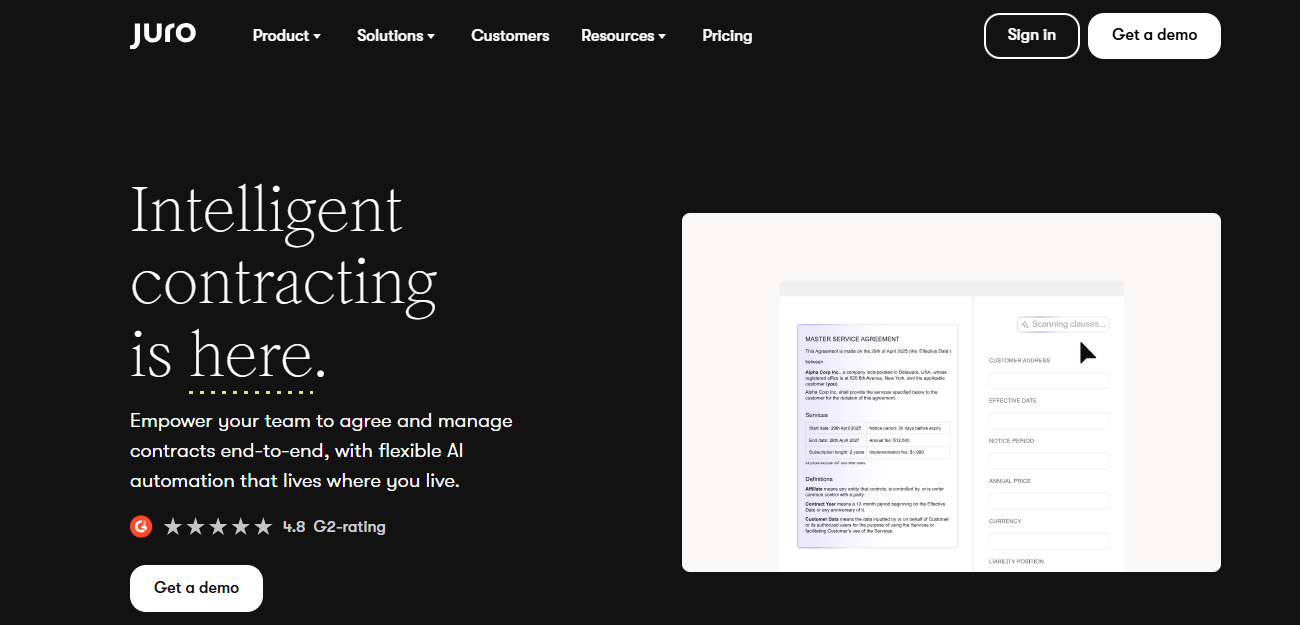
Juro is an AI-powered contract automation platform that supports legal, sales, HR, and finance teams in drafting, managing, and executing contracts within a single workspace. It embeds directly into commonly used business tools, enables self-service workflows, and speeds up contract lifecycles. The platform integrates natively with Salesforce and HubSpot CRM and connects to other applications through Zapier.
Features
- Embeds AI-powered contract automation across drafting, approvals, execution, and storage.
- Provides a rich-text template editor with conditional logic for self-service contract creation.
- Automates approval workflows to support efficient stakeholder review and sign-off.
Pros
- Accelerates contract negotiation with real-time editing.
- Offers strong customer support and effective onboarding.
- Allows unlimited users, workflows, and templates under its plans.
Cons
Provides limited analytics and reporting for data-driven needs.
Pricing
Juro applies custom pricing based on contract volume.
9. Icertis
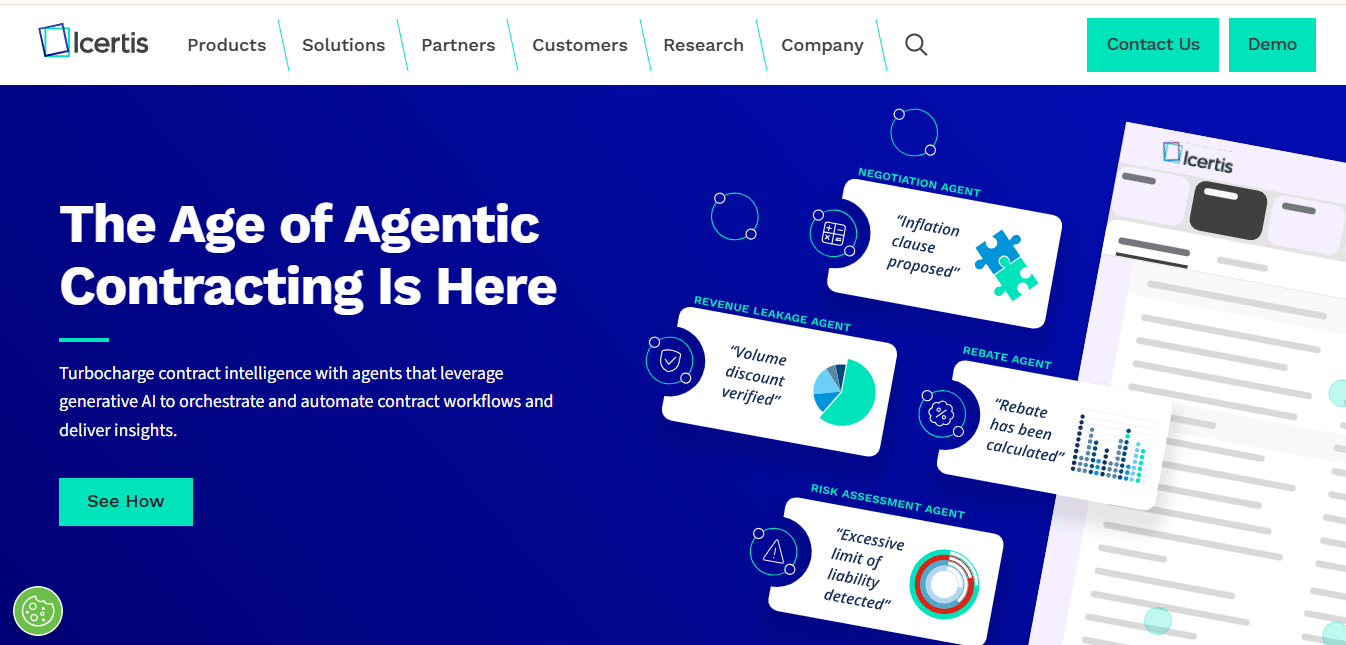
Icertis Contract Management is a cloud-based platform that manages the entire contract lifecycle. It supports enterprises with complex, global contract requirements by centralizing data, applying AI insights, and integrating across systems, languages, and geographies.
Features
Centralizes all contracts into an AI-powered system of record for the enterprise
Automates contract creation, negotiation, execution, and post-execution management
Provides AI-driven insights, risk identification, analytics, and visibility into performance
Pros
Integrates with leading ERP and CRM systems
Supports multiple languages and currencies
Adapts to diverse contract types and international compliance regulations
Cons
May not fit small businesses with simple contract needs
Steeper learning curve due to its advanced features
Pricing
Available upon request.
10. Concord

Concord manages contracts from intake to renewal with AI. You can create, collaborate, sign, and track agreements in a single workflow.
The platform supports contract drafting, real-time collaboration, e-signature, and AI-powered review. Business users draft from templates, negotiate directly in the browser (no Word attachments required), and receive AI reviews in just 23 seconds instead of waiting days for legal input. After signing, automated alerts manage renewals and obligations.
Features
- Use AI-powered upload and extraction to build a searchable repository of contracts.
- Extract key dates, payment terms, clauses, and obligations automatically with AI Copilot.
- Collaborate, draft, negotiate, and sign contracts directly in the browser without email attachments.
Pros
- Bulk upload capability.
- Strict version requirements ensure a consistent audit trail.
- Quick and simple set-up process.
Cons
- The product feels immature, with reports of poor user experience and interface.
- Difficulties arise when integrating contracts signed outside the platform.
- Limited document management capabilities.
Pricing
- Essentials: $399 per month
- Business: $699 per month
When choosing a contract lifecycle management software, focus on three things: adoption, integration, and scalability. Your team must find it easy to use, it should connect with tools you already rely on like your CRM or accounting software, and it should handle more contracts as your business grows. A system with plenty of features means nothing if no one uses it, if it doesn’t work with your current setup, or if it slows you down in the future. The best choice is a CLM your team will actually use, that fits into your existing workflow, and that grows with your needs.

